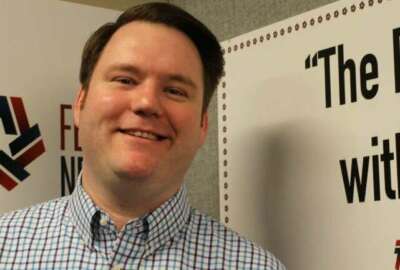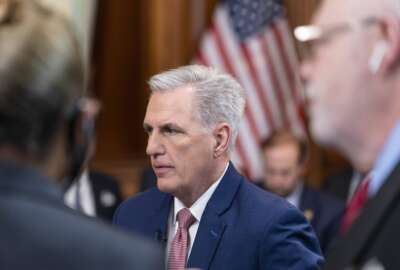
What one longtime government watchdog group recommends for the 118th Congress
Barely two months old, the 118th Congress is getting advice from all over. For decades, the Project on Government Oversight (POGO) has issued a list of 13 steps...
Barely two months old, the 118th Congress is getting advice from all over. For decades, the Project on Government Oversight (POGO) has issued a list of 13 steps Congress could take to restore trust in government, improve program performance, and keep things honest. For the highlights, the Federal Drive with Tom Temin with Dylan Hedtler-Gaudette, POGO’s Government Affairs manager.
Interview transcript:
Tom Temin In some ways, the advice kind of never changes, have better oversight over spending, better accountability and transparency into spending. Tell us what you think is the top of the list, though, this year that what the 118th Congress should do?
Dylan Hedtler-Gaudette Sure. Yes, I think you’re spot on there. The more things change, the more they stay the same. So we we do put out this report at the start of every new Congress. We call it the Baker’s Dozen, because there are 13 broad categories of recommendations. And you hit on some of the key high level points there. We do think that there is always the need, kind of an evergreen need to keep better track of spending and where it’s going, who it’s impacting. Is there equity in that spending? Is there accountability in that spending and so on. So we’ve got plenty of recommendations around that kind of thing. We’ve got plenty of recommendations around how to improve ethics standards across all three branches of government. Specifically, we do a lot of work on Pentagon and military oversight in those areas. One key area that I’ve been really focused on personally, and I was privileged enough to contribute to that part of this report, is around trying to deter and deal with foreign influence in U.S. and domestic policy making. That is also sort of an evergreen issue. But we’ve been seeing a sort of a ramp up in that problem in recent years with unregistered foreign agents lobbying and things of that nature. So we are doing some degree of work around that. And we think that the 118th Congress will be a good opportunity to make some progress there.
Tom Temin And by the way, how does that money come in? It’s not necessarily campaign money, is it?
Dylan Hedtler-Gaudette Not always, although we do see that as an issue from time to time. Technically, it is illegal for a person who is a foreign decide who located internationally to contribute directly in to domestic elections. So there are rules around that. We don’t always see those rules being enforced or adhered to per se, but there are rules around this. The way that money does tend to come through intermediaries. So foreign entities, be they foreign companies or foreign governments, will hire people here in Washington, here in the U.S. to do its own kind of advocacy and lobbying on their behalf. And they’re supposed to be a sort of a regulatory and transparency framework around that kind of lobbying, although we see from time to time, we see high profile examples of people, high profile people, in fact, doing things like advocating and lobbying on behalf of foreign interest who are not registered as they should be. So we do have these rules and systems in place, but we see quite regularly that those rules and systems are not adequate and they’re not doing the job.
Tom Temin Right. That’s kind of how some of that Soros money and similar types of funds come in freely. You can pick your party. Both parties decry dark money unless it’s their own dark money.
Dylan Hedtler-Gaudette That’s right. One thing in particular, and we just put out, an explosive investigation on this late last year and we have some recommendations on how to address it. In the baker’s dozen is the matter of former, high ranking officials and generals and people like that coming out of the military and then immediately go into work for someone overseas. Be it directly for a foreign government or be it for some kind of an entity or a corporation or a company that is based overseas, oftentimes controlled by a foreign government as well. So we’re seeing that happen. And we’ve seen that happen with some household names in recent years, including former General and Secretary of Defense Jim Mattis, former National Security advisor James Jones (D-Mo.). And so we see this happening, and it calls into question the integrity of policymaking and influence peddling here in domestic politics when we see people using their previous experience and their connections and their cash as high ranking U.S. officials, they use that and they get paid rather handsomely to do it on behalf of foreign interests. So we view that as a pretty big problem, too.
Tom Temin And this is a long list, and they all could be talked about for an hour. Briefly, one of the baker’s dozen is ushering in a new generation of accountable defense spending. And there’s a lot of facets to that diamond, but what’s your basic feeling there?
Dylan Hedtler-Gaudette So there’s that old adage that there are nothing quite so certain as dying and taxes. We think you should add a third bit to that. And that is ever increasing defense budgets. And so we think that there are many opportunities to take a look at defense spending and to make it a little bit smarter, a little bit more efficient, and a little bit more common sense. We don’t tend to agree with the view that you just need to spend more on defense no matter what. There are all kinds of systems out there that are not working that we’re spending a lot of money on. The F-35 comes to mind immediately, for example. But there are other ways to clean up the procurement and acquisition process as well, we call it clean contracting. So trying to make sure that when the Pentagon and the government more broadly, you’re trying to negotiate deals around contracts and things of that nature, that they’re able to do it in a smarter way that’s going to help preserve taxpayer dollars and use them in a responsible way. There are a lot of specific areas in which that is not happening. And so we’ve got plenty of recommendations on how to address that, including trying to require more information and more data transparency from contractors once they’ve received an award from the federal government, because currently they are not always required to provide that kind of information, which is a huge black box there. We also again, I referred to it earlier, but part of the issue around defense spending is we’re not always clear where it’s sending up and who’s making the decision about where it’s ending up. So that goes back to the old problem of trying to have more oversight and transparency and reporting mechanisms and collection of data around what’s happening with spending once it leaves the door from Congress.
Tom Temin We’re speaking with Dylan Hedtler- Gaudette. He’s government affairs manager at the Project on Government Oversight. And another area I wanted to ask you briefly about is promoting humane treatment by an accountability for government officials. And by that, I guess you mean the federal workforce, career wise, correct?
Dylan Hedtler-Gaudette Yeah, that is certainly a part of it. One thing we’re very concerned with, the politicization of the civil service, and specifically we saw in the previous administration, there was a proposal advance called Schedule F, which was going to make it a lot easier to get rid of career civil servants. And we view this as a potential effort to bring back the patronage and cronyism system to government, which will really undermine the actual efficacy and the quality of the federal government. And so we think that the civil service needs to be protected in some pretty important ways. But we also think that when it comes to the way that the American people are treated by certain aspects of the federal government, be it [Department of Homeland Security (DHS)], be it ICE, be [Customs and Border Protection (CBP)], be it FBI, we do think there needs to be a lot more oversight, a lot more accountability into those processes, particularly when you see the violations of constitutional rights and civil liberties happening and they go unpunished.
Tom Temin And there’s also the issue of Congress, itself. And one of your recommendations is empowering Congress to better serve its constituencies. There has been disbanded, the end of the 117 session, the Select Committee on the Modernization of Congress. A lot of those recommendations are being implemented and being debated. So what was your basic message on empowering Congress to better serve its constituencies?
Dylan Hedtler-Gaudette Yes. Well, I’m really glad you pointed out the modernization committee. We were super happy with what that committee did and how they operated. They were very collegial, very bipartisan. They actually served as kind of a model for how we wish the rest of Congress would function. Unfortunately, that’s just not going to happen anytime soon. But we did very much applaud the introduction and the implementation and the adoption of a lot of the modernization committee’s recommendations. And that work is ongoing to continue to implement those proposals. And one bit of good news is, even though the committee itself was disbanded, what did happen is that a subcommittee on the House Administration Committee was created to basically continue that work of the modernization committee. So we look forward to working with that subcommittee and with the broader House Administration Committee to try and continue to move ahead on the critical effort to basically make Congress the institution that it’s supposed to be in our system. It is actually, in our view, supposed to be the most powerful of the branches, because it is the branch that is closest to the people, it is the branch that is the most accountable and responsive to the people. And so we think that Congress needs to start cutting it nose off despite its face, and it needs to the resource itself, it needs to enhance its own capacities by ensuring that it has the staff it needs to do the job, that it has the technological capacities it needs to do the job, that it has the rules and the protocols in place to make sure that the job being done, is being done correctly and being done ethically. And there are many, many ways to do that. And so we really applaud that work and we want to see it continue. And we’re happy to be a part of that. And I think in doing so, you can create a more effective, more efficacious Congress and that Congress can in turn, hopefully rebuild some of the trust among the American people that it has lost in recent decades.
Tom Temin And when you deliver this report to Congress, do you think it has a thump with them?
Dylan Hedtler-Gaudette Yeah, we’ve gotten some really good response so far. And this comes from office across the aisle, Republicans and Democrats and House committee staff and personal office staff. So we have seen some really good engagement on some of these specific issues. There are some issues that are harder to deal with depending on who controls Congress at a given time, what the actual dynamics are. But I’d say broadly speaking, there is an appetite to still do things, to still get things done beyond the things that are in the headlines. And so that’s kind of the sweet spot that we as POGO try to slide into there, is whether there is some opportunity to get some real substantial things done, even if they’re not the top line, headline grabbing things.
Copyright © 2024 Federal News Network. All rights reserved. This website is not intended for users located within the European Economic Area.
Tom Temin is host of the Federal Drive and has been providing insight on federal technology and management issues for more than 30 years.
Follow @tteminWFED





